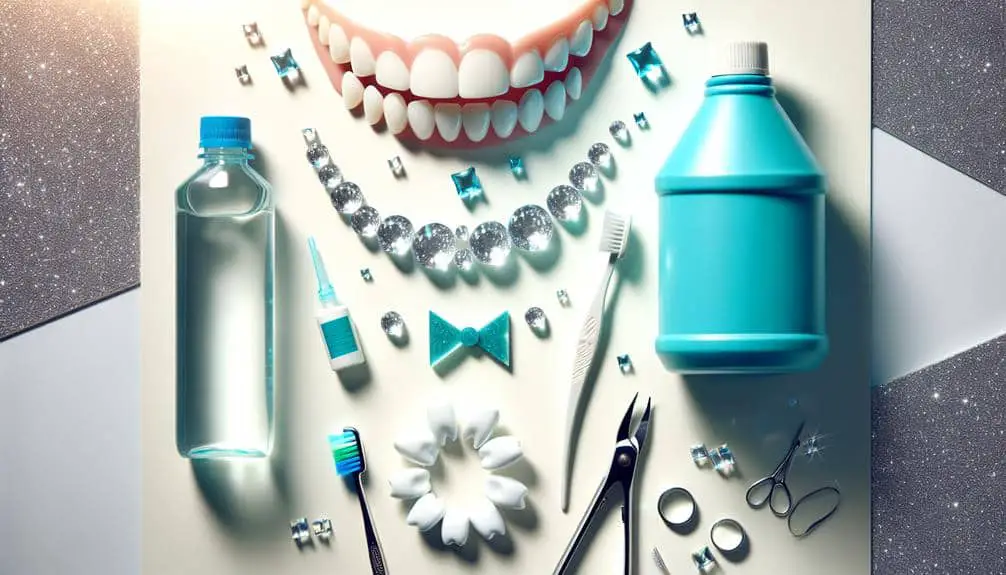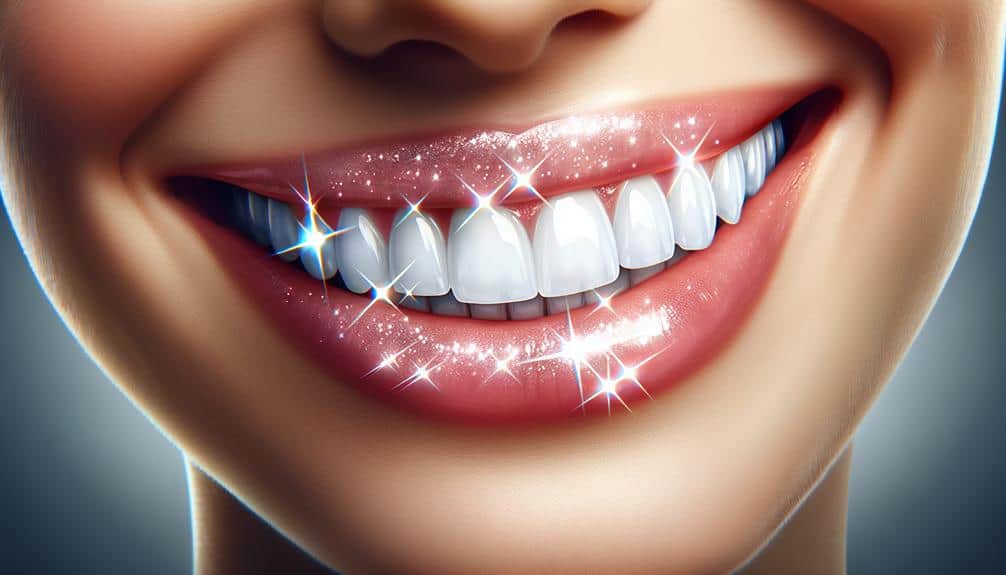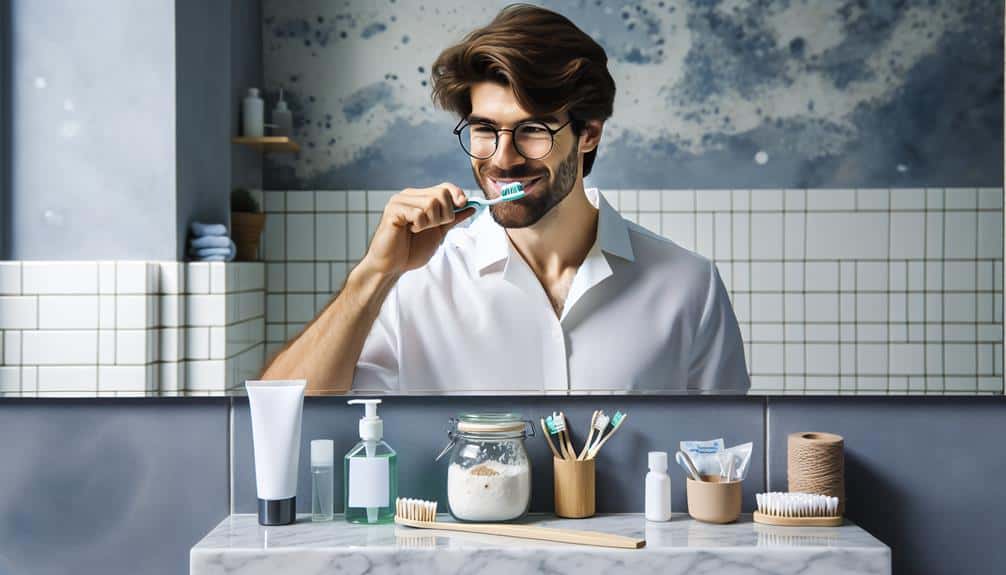For a brighter smile, consider trying hydrogen peroxide gel for uniform coverage and enhanced whitening benefits. Whitening mouthwash not only removes surface stains but also freshens breath and fights bacteria for improved oral health. DIY whitening paste made with baking soda and hydrogen peroxide can scrub stains effectively, but be cautious with ingredient proportions to protect your enamel. Professional whitening treatments offer tailored approaches with faster and longer-lasting results, while whitening strips provide a convenient at-home solution with varying effectiveness. Transform your teeth with these top hydrogen peroxide whitening solutions and reveal a dazzling smile.
Key Points
- Hydrogen peroxide gel ensures uniform coverage for optimal whitening results.
- Whitening mouthwash removes surface stains, freshens breath, and fights bacteria for enhanced oral health.
- DIY whitening paste with baking soda and hydrogen peroxide gently scrubs stains without enamel damage.
- Professional whitening treatments offer customized, long-lasting results with higher whitening agent concentrations.
- Whitening strips, using peroxide, provide convenient at-home whitening solutions with varying effectiveness.
Hydrogen Peroxide Gel
When using hydrogen peroxide gel for teeth whitening, ensure proper application for optimal results. Gel application is vital for ensuring uniform coverage on the teeth surface, which enhances the whitening benefits.
To begin, squeeze a small amount of gel onto a clean toothbrush or a tray provided in the whitening kit. Gently brush the gel onto your teeth, ensuring to coat each tooth thoroughly. Avoid swallowing the gel and try not to let it come into contact with your gums, as this can cause irritation.
Once applied, leave the gel on for the recommended amount of time as per the product instructions. After the specified duration, thoroughly rinse your mouth to eliminate all remnants of the gel. Consistent and proper gel application is essential to maximizing the whitening effects and achieving a brighter smile.
Whitening Mouthwash
For effective teeth whitening, incorporating a whitening mouthwash into your oral care routine can help enhance the brightness of your smile. Whitening mouthwash offers several benefits that can contribute to a whiter and brighter smile. Here are some key points to contemplate about whitening mouthwash:
- Mouthwash benefits:
- Whitens teeth by removing surface stains.
- Freshens breath for improved oral hygiene.
- Helps kill bacteria that can cause plaque and gum disease.
- Provides an additional layer of protection against cavities.
- Enhances overall oral health when used as part of a complete oral care routine.
- Mouthwash ingredients:
- Hydrogen peroxide: Acts as a bleaching agent to whiten teeth.
- Fluoride: Strengthens tooth enamel and prevents decay.
- Essential oils: Provide antibacterial properties for gum health.
- Xylitol: Helps reduce bacteria that cause cavities.
- Aloe vera: Soothes gums and promotes oral healing.
Incorporating a whitening mouthwash with these key ingredients can be a valuable addition to your teeth whitening regimen.
DIY Whitening Paste
To further enhance your teeth whitening journey, consider creating your own DIY whitening paste at home using simple and effective natural ingredients. One popular recipe includes mixing baking soda with hydrogen peroxide to form a paste. Baking soda acts as a mild abrasive that can help scrub away surface stains on teeth, while hydrogen peroxide serves as a bleaching agent to whiten your teeth.
When creating your DIY whitening paste, be cautious with the proportions of each ingredient to avoid damaging your enamel. A safe ratio to start with is 1 tablespoon of baking soda mixed with 2 tablespoons of hydrogen peroxide. You can adjust the consistency by adding more baking soda or hydrogen peroxide as needed.
To apply the paste, use a toothbrush to gently brush your teeth in circular motions for about two minutes. Be mindful not to scrub too vigorously to prevent enamel erosion. Rinse your mouth thoroughly after brushing. Remember to use this paste sparingly, as overuse may lead to tooth sensitivity. Incorporating this DIY whitening paste into your oral care routine can help maintain a brighter smile.
Professional Whitening Treatment
Consider seeking advice from a dental professional for a thorough evaluation before opting for a professional whitening treatment. Professional whitening treatments typically involve chairside procedures or in-office treatments conducted by trained dental professionals. Here are some key points to keep in mind when considering a professional whitening treatment:
- Customized Approach: Dental professionals can tailor the whitening treatment to your specific needs and address any potential concerns.
- Stronger Formula: Professional treatments often use higher concentrations of whitening agents, providing more effective results compared to over-the-counter products.
- Faster Results: In-office treatments can deliver significant whitening results in just one session, making it a convenient option for those seeking quick improvements.
- Safe Application: Trained professionals make certain the whitening agents are applied correctly, minimizing the risk of gum irritation or tooth sensitivity.
- Long-lasting Effects: Professional whitening treatments can offer longer-lasting results, maintaining your bright smile for an extended period compared to DIY methods.
Whitening Strips
When exploring teeth whitening options, whitening strips offer a convenient and popular at-home solution. Strip application is straightforward: you simply apply the adhesive side of the strip to your teeth, ensuring it covers the front surface adequately. These strips are typically worn for a specified amount of time, often around 30 minutes, allowing the whitening agent to work on your teeth.
Strip effectiveness varies depending on the brand and formulation. Most whitening strips use hydrogen peroxide or carbamide peroxide as the active ingredient, which helps break down stains on the teeth. Research has shown that whitening strips can effectively lighten teeth by several shades when used consistently over a period of time. However, individual results may vary based on the initial tooth color and the severity of discoloration.
Frequently Asked Questions
Can Hydrogen Peroxide Whitening Solutions Cause Sensitivity in Teeth?
Using hydrogen peroxide whitening solutions can cause sensitivity in your teeth. To manage this, consider using desensitizing toothpaste or reducing the frequency of whitening treatments. Alternatively, explore gentler whitening methods like whitening toothpaste or professional dental treatments.
Is It Safe to Use Hydrogen Peroxide Whitening Solutions on Dental Work Like Crowns or Veneers?
When it comes to dental restoration work like crowns or veneers, it's important to tread carefully with hydrogen peroxide whitening solutions. These solutions can lead to potential issues like discoloration on veneers, so consult your dentist for safe alternatives.
How Long Does the Whitening Effect From Hydrogen Peroxide Solutions Typically Last?
To maintain the whitening effect of hydrogen peroxide solutions, focus on long-term effectiveness through a consistent maintenance routine. Lifestyle habits play an essential role in stain prevention. Regular touch-ups and avoiding staining foods can help prolong results.
Are There Any Potential Side Effects of Using Whitening Mouthwash Regularly?
Using whitening mouthwash regularly can have potential long-term effects and risks. To minimize these, follow precautions by not exceeding usage frequency. Be mindful of any sensitivity or irritation. Consult your dentist for personalized advice.
Can DIY Whitening Paste Be Harmful if Ingested Accidentally?
Accidentally ingesting DIY whitening paste can pose potential risks to your health. If this occurs, follow emergency protocol by contacting poison control and seeking medical attention immediately. Never use products orally not intended for ingestion.
Conclusion
To sum up, hydrogen peroxide is a popular and effective teeth whitening solution.
Did you know that according to the American Dental Association, hydrogen peroxide is considered safe and effective for whitening teeth when used properly?
Whether you choose a gel, mouthwash, paste, professional treatment, or whitening strips, incorporating hydrogen peroxide into your oral care routine can help you achieve a brighter, whiter smile.



